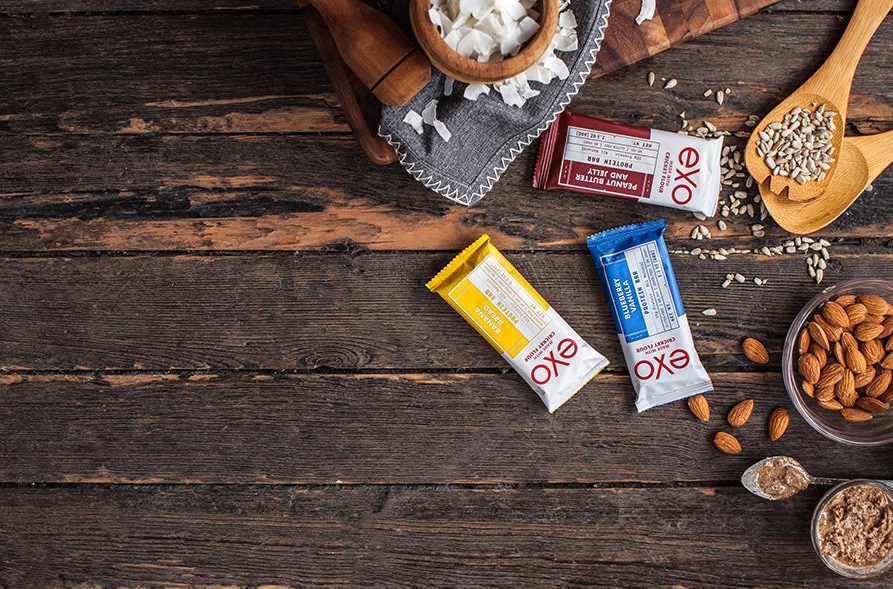https://www.instagram.com/p/BFWoJmiks_M/
Exo wants you to eat crickets. Co-founders Gabi Lewis and Greg Sewitz ordered thousands of crickets to their dorm room at Brown and it wasn’t for a senior prank. While still at school, they tinkered with different uses of cricket protein and they landed on simple, flavorful fruit and nut packed bars that leave you guessing, “Are you sure there was a cricket in there?”
Exo is set to join our sister pub Edible Manhattan next month at Food Loves Tech: a first-of-its kind city scale expo showcasing the technologies shaping the future of food. Interest piqued? Join us June 10-12.
Edible Brooklyn: What led you to founding Exo?
Gabby Lewis: We started the company as college roommates. I was going to join the world’s largest hedge fund upon graduating and Greg was going to travel to India to teach neuroscience to monks. We started working on the idea as a side project during our senior year and then it really took off, so we decided to go all in. Personally, it intersects all of my interests—nutrition, fitness, sustainability, food—and I can’t imagine doing anything more enjoyable right now.
EB: It’s impressive for college students to be so motivated. Where did the inspiration come from?
GL and GS: Greg had just returned from a conference at MIT hosted by the Dalai Lama on climate change and resource scarcity where it was suggested that insects could be a great sustainable protein source. At the time, I was really obsessed with nutrition and was making my own protein bars because the market was saturated with products that tasted terrible—essentially candy disguised as health food. Greg suggested I use cricket protein, and from there we dove into researching insect protein.
We realized there was a huge potential for insect protein that was then unrealized; nobody was really using insects as an ingredient. After shipping a few thousand crickets to our dorm room and some homemade bars later, Kyle Connaughton, the former head of R&D at Heston Blumenthal’s three-Michelin-star restaurant, The Fat Duck, joined our team and we launched a Kickstarter campaign.
https://www.instagram.com/p/BEgcv9EEs4k/
EB: I can’t even imagine how your friends reacted to mass quantities of crickets living next door to them. Has there been some pushback at the thought of eating insects throughout this process?
GL and GS: We were one of the first few to market with cricket protein but we are pretty happy with how the market is expanding now. We need a bigger movement around insect proteins. The biggest pushback, and our chief complaint about protein bars in general, was taste. People hear cricket bars and think they’re going to see heads and eyes. But it’s ground cricket flour that we’ve worked into tasty recipes. We want people’s first interaction to be the best it can be. We use whole ingredients, like fruit, nuts, seeds and honey. Kyle and his team are always tinkering with new flavors and versions.
Aside from the actual bars, we’ve received tremendous support. Kids are sending us their school projects on crickets. Cricket farmers are reaching out and sending us samples. Nutritionists and fitness instructors have noted their excited to see a new form of protein where flavor is as important as nutrition.
https://www.instagram.com/p/BBprMilks9V/
EB: Will you expand into other insect proteins?
GL and GS: There are over 1,600 species of edible insects that are all high in quality protein and fats, so there’s lots of room to grow. That said, we’re pretty focused on cricket protein for the time being and looking at broader applications for that before moving into other insects.
EB: How do you see Exo fitting into the future of the food ecosystem as more companies leverage technology to solve food issues?
GL and GS: The current food system is broken and there are many potential ways to solve it that are exciting—from lab grown meat to insect meat. Our aim is to introduce one alternative, to fit into a more diversified and resilient system for a growing population. A healthy food system is one that’s varied, so we’re glad to be one of many types of protein. We compare what we’re doing to sushi ten to fifteen years ago; the California roll was a great gateway for people to try it. We’re in California roll mode now, educating prospective clients and learning from others on how to make our product great.



